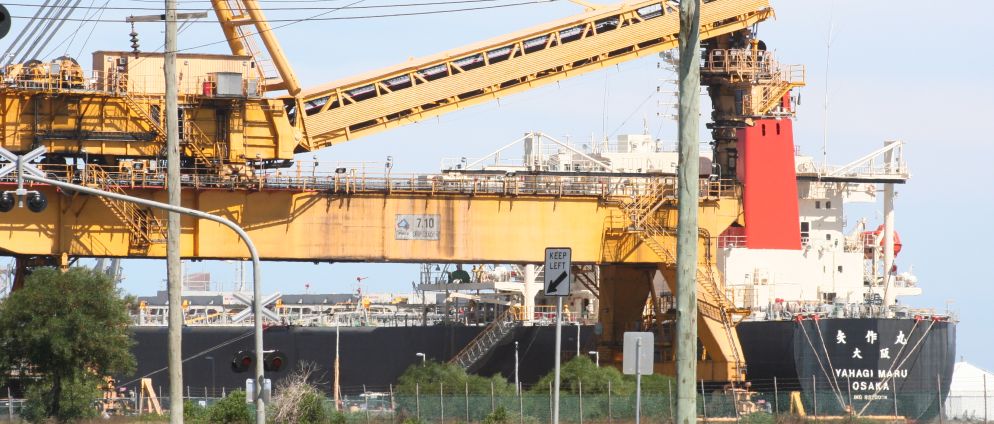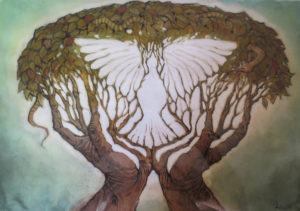Opinion by Greg Ray
Bob Brown is right. There is a global dimension to the anti-protest laws Australian governments have been rushing to enact. They – both major parties included – are simply regurgitating a script written for them by the corporations that run the global economy.
“The striking similarity between Australian [anti-protest] legislation and the UK’s legislation is a clue which indicates we’ve got a global corporate governance,” Brown told Crikey reporter Maeve McGregor.
I was going to say exactly the same thing but he beat me to it.
Nor is it only environmental protests the corporate overlords are trying to suppress: it’s any form of effective dissent. They have used their money and power to buy control over our governments, which means the laws get made for them along the lines of templates they provide. They get tax breaks, subsidies, easy access to public resources, first dibs on privatised assets which they turn into dysfunctional rip-off monopolies or cartels and a free ride in the mostly corporate-owned media.
The corporations know that people are getting more and more aware of, and nervous about, the ruin of the natural environment, the drift towards corporate fascism and the wild inequalities in their global system. They know that more and more people are inclined to speak up about their concerns and to act on them by attending protests and lobbying politicians. That’s especially so since every other avenue for comment or dissent against their activities has been effectively closed. Approval processes are stacked. Sanctions and penalties for corporate misbehaviour are paltry and rarely applied. Consultation processes are tokenistic and made to be ignored. The only option left is public protest, demonstration and civil disobedience. So to close that last remaining avenue for dissent, the corporations have got their captive parliaments to bring in laws that make protest a bigger crime than assault, robbery, theft or fraud.
The present high-profile case that showcases the corporate capture of government and police is that of activist Deanna “Violet” Coco, who got 15 months jail for disrupting traffic for half-an-hour or so.
From my experience watching the justice system in action, you can get a lot less than that for assaulting somebody. Here’s one recent example. If you wear a white collar, are a company director or have mates in the right places then you have carte blanche to lie, cheat, steal and cause utter misery to as many people as you like. Be a destructive criminal on the corporate side of life and only very bad luck will get you any kind of penalty at all, and usually only a piddling fine.
As Bob Dylan once wrote: “All the criminals in their coats and ties are free to drink martinis and watch the sun rise”.
Violet Coco wrote of her plight that protest was a last resort. “Make no mistake, I do not want to be protesting. Protest work is not fun. It’s stressful, resource-intensive, scary and the police are violent. They refuse to feed me, refused to give me toilet paper and have threatened me with sexual violence. I spent three days in the remand centre. I do not enjoy breaking the law. I wish there was another way to address this issue with the gravitas that it deserves.”
The Coco case is far from the first and far from the only case. In NSW you can be quizzed by police just for having a bumper sticker saying something negative about coal.
Around the world governments are also always under pressure from their owners in the corporate world to crush trade unions. Unless they are trade unions representing the right kind of people, like doctors or lawyers or police. Politicians are terrified of the police unions, as a case in point. Upset the police and things can go badly for you, some of them seem to believe. And anyway, they need the police to enforce the laws they enact to oppress everybody else. So, again all the over the world, police are getting more and more like the military, with nastier weapons, wider roles and greatly diminished accountability.
Two class police-related stories from recent times in Australia. First, the forceful arrest of elderly celebrated lone protester Danny Lim which resulted in him being hospitalised and now apparently unable to walk unaided. This casual brutality against a harmless and popular peaceful protester appears to be sending a message: “Don’t speak out, keep your head down and shut up or we will bash you”. Second, the astonishing story of the ACT Director of Public Prosecutions complaining in writing that the Australian Federal Police were engaged in a “very clear campaign to pressure” him not to proceed with charges against the alleged rapist of Brittany Higgins. The astonishing part, to me at least, is that the prosecutor was brave enough to make the allegation against the police and to call for an inquiry into them. I will be amazed if that happens, especially since the police union has gone on the attack over this “slur” on the integrity of the force. Perceptions matter in policing, as I have noted before, and the AFP has – in my opinion – a very serious problem in that regard.
We would like to believe that the police, along with other branches of the public service, are not politically aligned and will act in the interests of the community. Losing trust in the police is a vicious circle: see them as the enemy, as pliant tools in the hands of the political and corporate overlords, and they will come to act more and more in that role. Accountability is the key to avoiding this nasty spiral.
The war on dissent and protest is a global phenomenon, and not a good one. It is characterised by victimisation of dissenters, by propaganda and censorship and ultimately backed by the iron fist of authority. So far the victims are mostly “only” the altruists – the animal rights and environmental protesters and journalists who persist in exposing facts the powerful would prefer remain secret. But just wait. When the wheels really start falling off the system and you and I – finally outraged enough to act – step outside with our own protest placards we will find out the hard way that we should have been paying attention a long time ago.

More nonsense from mining HQ
The Minerals Council reckons capping the price of coal might lead to higher power prices for consumers. Oh my goodness, with a straight face too.
This is what happens when you let big mining companies own your country. They buy your government, which then spends your money helping the corporations ship your resources offshore to the highest bidder. When you want some coal or gas for your power station or your brick kiln the coal and gas miners tell you to pay the world price, sucker, even if that means old people freezing in the dark or being afraid to use their air conditions in a heat wave, or if it means having to shut your brick kiln and sack your employees, or raising your brick prices so high that people don’t want to buy them anymore.
Yes, our power stations are supplied under existing contracts. But these expire and have to be renegotiated under whatever conditions of global supply and demand apply at the time. And yes, our power stations use cheaper, lower quality coal. But they still have to pay the spot price for above-contract requirements. No favours are given by the parasite to the host, as far as I can see.
The mining corporations will pull any string to increase and maintain their profits. Australia is insane for letting them get away with it. They should be forced as a matter of course to pay taxes on top of their resource access royalties and also forced to reserve supplies for the domestic market at lower than world prices for whatever grade of product is required. It is madness to believe they will do anything out of the goodness of their hearts. Corporations don’t have hearts, and if they did then they would not be good ones.


